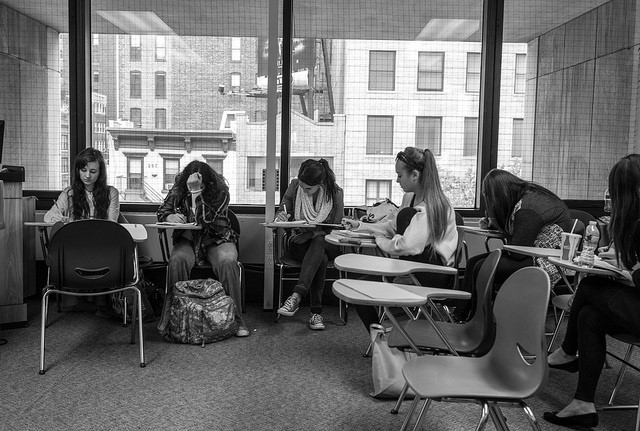3 Tips for New Teachers Who Want Well-Behaved Students

Student defiance is an unpleasant experience for all teachers, new and experienced. But as a new teacher, this can be particularly daunting. You might be tempted to take the belligerent actions personally.
Even worse, by not controlling the students well, you run the risk of creating a chaotic classroom atmosphere where the actions of one (or a few) students lead the others to believe that defiant behavior is acceptable.
It is normal as a new teacher to worry about defiant students. However, making students have control over their behaviors by setting rules together can help you avoid this problem. Make rules that everyone believes are needed, and then be firm on enforcing them when students try to transgress them.
Here are three guidelines that will help you create the kind of learning environment where students respect and admire you.
- Be proactive.
Don’t wait for the first defiant student to decide how you will handle the situation. Start your teaching career by establishing defined routines and rules. You can work on these together with your students during the first few days of class. When your students are involved in defining these aspects of classroom life, they will be more likely to follow them as they will understand why these rules are important.
Encourage collaboration in your classroom by helping students to work with and help each other. On the other hand, make sure that the groups that are formed are not used as to defy the teacher’s authority or to pick on other students. This can be avoided by teaching your students to develop a “group support” mindset.
One example of good cooperation would be if you and your students work together on developing a reward system. Let us assume there are a maximum of 50 minutes in a school day which a student could have as free time. You and your students could make a chart to list “good” behaviors, focusing on how the 50 minutes of free time could be earned. “Helping a classmate in need” might be agreed to deserve ten minutes, “organizing my desk” deserves five minutes, and so on. Alternatively, students could be divided into groups to discuss the matter, and come up with a poster outlining their ideas. Students could present their posters to other students and decide which ideas to include.
Active participation, including group work with other students and social environments, is essential when it comes to students’ learning. Avoid thinking that silence in the classroom means students are concentrating and perfectly absorbing the new materials. Indeed, discussion and group works help students delve deeper into their learning materials. Some students might find it easier asking a few of their classmates rather than speaking out in front of the whole class. An interactive classroom enhances learning for everyone, and you should be open to gaining new insights from your students. Active participation contributes to enhancing the thought process in students, since participation cannot arise without personal reflection on the topic.
- Establish routine.
Most classroom activities are governed by routines. From taking attendance to students’ bathroom pass to ending time, students are to follow the routines made by the school, as well as by individual teachers. Try to find ways to cut down on time needed for simple routines, such as initially having your students grouped in alphabetical order early in the year to make taking attendance easier. Although students might make changes regarding their seats after the first few days, consider distributing a seating chart diagram and have students write down their names on the corresponding spot. Have a seating chart on your desk and also a pocket size one which you can carry with you when moving around the classroom.
The earlier you set the routine and allow your students time to adjust to it, the more time you will save in the long run. Before deciding on the routines, to save students from confusion, consult with other teachers or an official school handbook to know the basic protocols. Most schools will have the basic set, so asking these questions is a good idea:
- How are attendance checks conducted and how should they be reported?
- What are the steps that need to be taken in the following cases: tardy students, sick and/or physically hurt students, students who cannot return home due to parents’ tardiness and/or missing the bus, students who have to be dismissed early, and seriously misbehaving students who need further discipline actions?
- How does the hall pass system work?
- How should failing grades be reported?
- What are the procedures for using common school items and/or booking special rooms?
- How should teachers deal with serious misbehaviors such as cheating or stealing?
- How should individual parent visits and parent-teacher meetings be conducted?
Routines for checking attendance and collecting or distributing assignment need to be well established. To get the students settled quickly at the beginning of the class, it is recommended that you give short tasks to students. One good way is to have a question on the board, request that the students take their seats and start working on it quietly.
- Know why rules benefit students.
Students appreciate knowing what actions and behaviors are allowed and which are not. Make consequences evident to your students so that they are able to appreciate the potential seriousness of their actions. Although these limits will prevent students from misbehaving, too many strict rules are unnecessary. Adjust your rules for each class to take into account the various characteristics of individual classes. Just like routines, teachers should discuss the limits with the student and make applicable changes.
It is more convenient to have a several rules that are general, instead of making numerous detailed ones. Some examples could include the following:
o Teachers should ask students to be ready to learn, just as teachers are ready to teach. That includes things from students discontinuing talking when the class is about to begin, to bringing needed stationery items.
o When students come in, they should take seats and start working on warm-up exercises.
o Be polite and respectful to others. This includes things such as not disturbing the class, not stealing other’s property, and not making fun of other students.
o If there is a case where the students need to go against the rule, students should come up to teachers’ desks to seek for permission and/or help.
Teachers have to make sure that students know and fully understand the rules, so after the rules are determined, teachers should give a clear explanation of the consequences. In some cases, teachers may administer a test to check the student understands of the rules. To remind students of the rules, teachers could have a copy of the classroom where every student can see it, and give copies to students and/or their parents as well
When the rules and consequences are determined and understood by students, you have taken the first step to a well-managed classroom. Feel free to give yourself a pat on the back.





